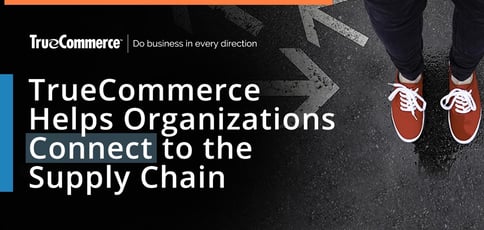
TL; DR: TrueCommerce, founded in 2006, provides a unified platform that works to connect ecommerce customers, suppliers, channels, and systems. The suite of services helps everyone from startups to established enterprises improve timeliness, accuracy, and agility while eliminating tech burdens. Moving forward, the company will focus continually on advancing its automation technology for vendor-managed inventory.
Airports like Hartsfield-Jackson International Airport in Atlanta and Los Angeles International Airport serve at the heart of the U.S. air travel system, acting as central coordination points for arriving and departing flights. The system has long been in place for a reason: It saves airlines money and provides passengers with better routes to their destinations.
But the hub-and-spoke model isn’t limited to the airport industry. As ecommerce activity continues to skyrocket, it’s also being used to foster connectivity between stakeholders in online retail — minus the painful layovers, of course.
Just ask the folks at TrueCommerce.
“We’re looking to serve as a hub connecting marketplaces, storefronts, business systems, supply chain channels, customers, and partners,” said Ross Elliott, CSO of the company. “The goal is to integrate all of these connections and help users manage them through a unified ecommerce solution.”

Ross Elliott, CSO, told us how TrueCommerce connects businesses to the supply chain while freeing them from on-premises server management.
The platform does just that — pulling together the online technology retailers need to compete in a dynamic global marketplace. These moving parts include everything from Electronic Data Interchange (EDI) and inventory management systems to digital storefronts like Shopify and online marketplaces like Amazon.
TrueCommerce also liberates businesses of all sizes from the costly and time-consuming management of on-premises servers through a fully managed EDI service. This end-to-end solution provides customers with the skills and cloud-based infrastructure needed to improve operational efficiency and cut capital investment costs.
Ultimately, by removing technical burdens and risk, the platform makes it easier than ever for businesses to focus on what’s most important — their customers.
Leading the Way in Electronic Data Interchange (EDI)
Michael Cornell, Flint Seaton, and Ross founded the supply chain software company Accellos in 2006.
“The three of us had worked together at another company, sold that company, went our separate ways, and decided to get the band back together again,” Ross told us. “We sat in a corner booth at a Colorado Springs Starbuck and scribbled out a preliminary business plan. Our thesis was that every member of the supply chain — whether buying, selling, or consuming — was going to need to be more connected in the coming years.”
Their solution was to introduce tech-based supply chain technology that would meet the connectivity needs of customers to help drive growth. The trio grew through acquisitions rather than bootstrapping.
“We were fortunate enough to get financial backing through a private equity firm, we kicked in some of our own money, and the rest is history,” he said. “From 2006 until today, we bought 18 different businesses. Part of the company’s history involves creative stitching in terms of intellectual property.”
Ross, the overall architect for the TrueCommerce Foundry technology platform, joined the TrueCommerce brand in 2014 through its merger with Accellos. The company’s platform evolved its focus beyond EDI through continuous innovation and investments, incorporating solutions for managing digital storefronts, online marketplaces, product data, and vendor inventory.
Ross told us the recent pandemic has only reaffirmed the founding group’s original ideas.
“It forced people to become more connected because they couldn’t go out of their houses,” he said. “It forced sellers to ship directly because they didn’t have the time necessary to get products from one distribution center to another and then to a store. And so they disintermediated the retailer to some degree.”
It also forced businesses to jump from on-premises server management to more flexible and remotely accessible cloud models.
Solutions for Connectivity, Product Info, and Visibility
A few years back, TrueCommerce hired the major consulting organization Bain & Company to research its customer base. When asked to provide their top three needs in terms of unified platforms, participants overwhelmingly pointed to three areas: connectivity, data, and visibility.
After pointing to the need for connectivity across all stakeholders and channels, respondents said that rich product information data management was becoming a challenge.
“If you’re going to sell on Amazon, eBay, or your own web store, you have to have solid product information,” Ross said. “Otherwise, what you’re presenting to the customer is flawed, which means that the transactions are likely to be flawed because customers think they are buying one thing and get something totally different.”

The platform helps businesses scale as they grow through built-in connections.
Finally, respondents said they needed better visibility into customer information and data used for processing marketplace orders and syncing inventory. Fortunately, the TrueCommerce global trading network addresses all three needs.
“We have 130,000 resellers and wholesalers connected to that commerce network,” Ross said. “We have integrations with nearly every business system and ecommerce channel. We also built a data management system that syndicates rich product content. And because all of the transaction flow comes through the hub, we can gain the visibility users need.”
On top of that, the TrueCommerce platform includes a system to proactively alert customers who opt-in for text messaging of updates on deliveries.
Helping Startups and Enterprises Reduce Tech Burdens
The breadth of the TrueCommerce platform allows the company to meet the needs of entrepreneurs, small businesses, and large, well-established enterprises.
“I contend that we are the leading provider of solutions for people that deal in poo,” Ross said. “Both Squatty Potty and Poo-Pourri are customers, and they have similar startup stories. From a distribution perspective, their first customer is a retail corporation like Walmart. Walmart says, ‘If you’re going to do business with us, here’s how you’re going to do business with us.’ We can hook them up to Walmart, and if they’re successful in the market, they’re already connected with Amazon, Target, Costco, among many others.”
On the other end of the spectrum is Procter & Gamble, a multinational consumer goods corporation. TrueCommerce helps these larger clients make sure they have the right products in the right stores and manage order fulfillment.
“If Procter & Gamble wants to retrieve data on Bounty paper towels, we have information on what stores have the product, what stores need additional product, and how to pack a truck, among other data,” Ross said. “But we also help them fulfill small orders for packages of Charmin on Amazon, which differs from their traditional business of shipping pallets of Bounty towels to Kroger.”
In short, TrueCommerce empowers retailers large and small to focus on their core business needs rather than the underlying server infrastructure and data management. “We help them with the plumbing, and that provides an unseen value proposition in that it frees them up to work on their businesses.”
Up Next: Advanced Machine Learning Tools
Ross told us that moving forward, TrueCommerce will remain firmly focused on increasing global connectivity. (Two-thirds of the company’s customers are based in North America, with the remaining spanning the UK, Copenhagen, Brussels, and Sydney.)
“We will always invest in connectivity,” Ross said. “Part of it is visibility. But part of it is also trying to use things like machine learning to draw correlations from the information. We have two or three machine learning solutions that we offer today but more on our road map.”
The company is also helping small merchants plan for selling on Amazon, to eBay, Target, and Walmart, among other channels.
“We help our friends at Procter plan every Bounty towel that goes on every shelf in Kroger, Safeway, and so forth, but that’s way out there for the little merchants. We are releasing some new products aimed at that little merchant to give them that same kind of planning capability that the larger retailers enjoy. And we’re excited about that.”
HostingAdvice.com is a free online resource that offers valuable content and comparison services to users. To keep this resource 100% free, we receive compensation from many of the offers listed on the site. Along with key review factors, this compensation may impact how and where products appear across the site (including, for example, the order in which they appear). HostingAdvice.com does not include the entire universe of available offers. Editorial opinions expressed on the site are strictly our own and are not provided, endorsed, or approved by advertisers.
Our site is committed to publishing independent, accurate content guided by strict editorial guidelines. Before articles and reviews are published on our site, they undergo a thorough review process performed by a team of independent editors and subject-matter experts to ensure the content’s accuracy, timeliness, and impartiality. Our editorial team is separate and independent of our site’s advertisers, and the opinions they express on our site are their own. To read more about our team members and their editorial backgrounds, please visit our site’s About page.

